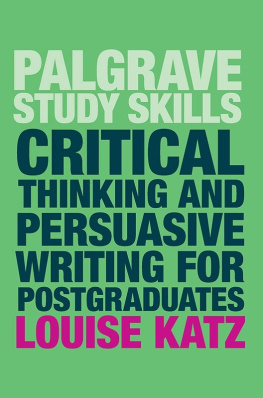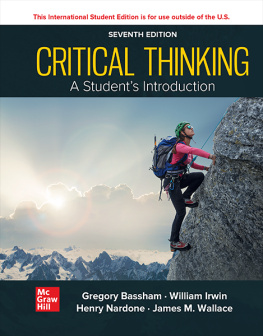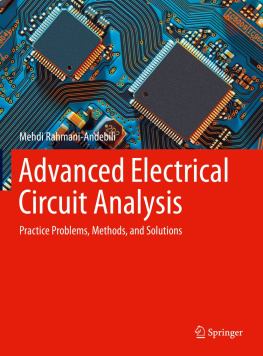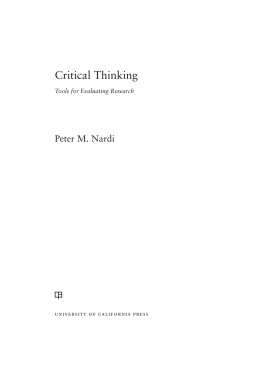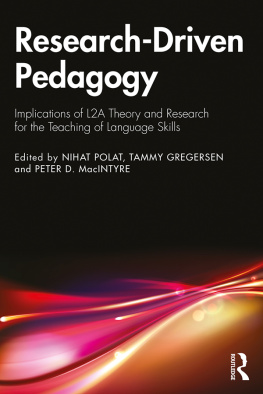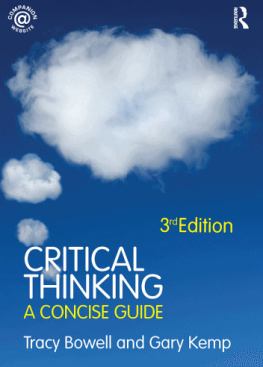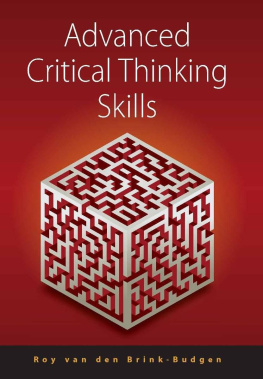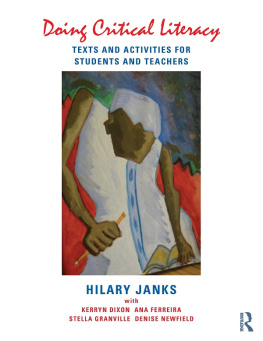Critical Thinking and Persuasive Writing for Postgraduates
For a complete listing of all our titles in this area please visit he.palgrave.com/study-skills
www.palgravestudyskills.com the leading study skills website
Palgrave Study Skills
Business Degree Success
Career Skills
Cite Them Right (10th edn)
e-Learning Skills (2nd edn)
Essentials of Essay Writing
Get Sorted
Great Ways to Learn Anatomy and Physiology (2nd edn) How to Begin Studying English Literature (4th edn) How to Study Foreign Languages
How to Study Linguistics (2nd edn)
How to Use Your Reading in Your Essays (2nd edn) How to Write Better Essays (3rd edn)
How to Write Your Undergraduate Dissertation (2nd edn)
Improve Your Grammar (2nd edn)
Information Skills
The International Student Handbook
The Mature Students Guide to Writing (3rd edn) The Mature Students Handbook
The Palgrave Student Planner
The Personal Tutors Handbook
Practical Criticism
Presentation Skills for Students (3rd edn)
The Principles of Writing in Psychology Professional Writing (3rd edn)
Researching Online
The Student Phrase Book
The Students Guide to Writing (3rd edn)
Study Skills for International Postgraduates Study Skills for Speakers of English as a Second Language
Studying History (4th edn)
Studying Law (4th edn)
Studying Modern Drama (2nd edn)
Studying Psychology (2nd edn)
Studying Physics
Success in Academic Writing
Smart Thinking
The Undergraduate Research Handbook
The Work-Based Learning Student Handbook (2nd edn)
Work Placements A Survival Guide for Students Write it Right (2nd edn)
Writing for Engineers (3rd edn)
Writing for Law
Writing for Nursing and Midwifery Students (2nd edn) Writing History Essays (2nd edn)
Pocket Study Skills
14 Days to Exam Success
Analyzing a Case Study
Brilliant Writing Tips for Students
Completing Your PhD
Doing Research
Getting Critical (2nd edn)
Planning Your Dissertation
Planning Your Essay (2nd edn)
Planning Your PhD
Posters and Presentations
Reading and Making Notes (2nd edn)
Referencing and Understanding Plagiarism (2nd edn) Reflective Writing
Report Writing
Science Study Skills
Studying with Dyslexia
Success in Groupwork
Time Management
Wheres Your Argument?
Writing for University (2nd edn)
Palgrave Research Skills
Authoring a PhD
The Foundations of Research (2nd edn)
Getting to Grips with Doctoral Research Getting Published
The Good Supervisor (2nd edn)
PhD by Published Work
The PhD Viva
Planning Your Postgraduate Research
The PhD Writing Handbook
The Postgraduate Research Handbook (2nd edn) The Professional Doctorate
Structuring Your Research Thesis
Palgrave Career Skills
Excel at Graduate Interviews
Graduate CVs and Covering Letters
Graduate Entrepreneurship
The Graduate Career Guidebook
How to Succeed at Assessment Centres
Social Media for Your Student and Graduate Job Search
Work Experience, Placements and Internships
CriticalThinkingand Persuasive Writing for Postgraduates
Louise Katz

Louise Katz 2018
All rights reserved. No reproduction, copy or transmission of this publication may be made without written permission.
No portion of this publication may be reproduced, copied or transmitted save with written permission or in accordance with the provisions of the Copyright, Designs and Patents Act 1988, or under the terms of any licence permitting limited copying issued by the Copyright Licensing Agency, Saffron House, 610 Kirby Street, London EC1N 8TS.
Any person who does any unauthorized act in relation to this publication may be liable to criminal prosecution and civil claims for damages.
The author asserted her right to be identified as the author of this work in accordance with the Copyright, Designs and Patents Act 1988.
First published 2018 by
PALGRAVE
Palgrave in the UK is an imprint of Macmillan Publishers Limited, registered in England, company number 785998, of 4 Crinan Street, London, N1 9XW.
Palgrave and Macmillan are registered trademarks in the United States, the United Kingdom, Europe and other countries.
ISBN 9781137604422 paperback
This book is printed on paper suitable for recycling and made from fully managed and sustained forest sources. Logging, pulping and manufacturing processes are expected to conform to the environmental regulations of the country of origin.
A catalogue record for this book is available from the British Library.
A catalog record for this book is available from the Library of Congress.
Contents
Introduction
Education at all levels is an animated process produced in the communicative exchanges of teachers and learners. In this spirit, Critical Thinking and Persuasive Writing for Postgraduates provides suggestions for postgraduates (and undergraduates looking ahead to higher degrees) and their teachers on how to continually work towards improving on these skills. There is already a fair bit of literature available that is geared towards undergraduate study, but this book deals with the particular concerns of postgraduates those engaged in coursework who are not yet experienced writers, those in research programmes at masters and doctoral levels, and students and academics involved in independent research projects. It also includes a strong theoretical component. There are two reasons for this. One, to enrich the readers understanding of processes involved in refining higher learning skills and writing practices; and two, to contextualise notions of critical thinking within a historical and cultural framework.
Often the literature on critical thinking focuses on its application to study and workplace situations or to assist in decision-making and problem-solving, whether professionally or ethically. This is of course vital: thinking well does not begin with a course of study and end with a university degree. Good employers look for people who can make thoughtful decisions and who have the ability to ask the sort of questions that will benefit their institution. To do this, they need to be able to think of those questions in the first place. Such employers also want people who have long-term vision, are at home with complexity, and can not only work out solutions to problems but actively look for problems to solve. (Problem-finding requires a much higher order of cognitive ability than solving already identified problems!) Imaginative and independent thinkers are needed those able to make intelligent inferences and can put all of these attributes to practical use. Sounds like a lot? It is. These are all aspects of critical practice treated in this book, aspects that rely on linking, rather than dividing, criticality and creativity.
However, while considering vocational requirements and also explicating the ethical dimensions of independent, active thinking, Critical Thinking and Persuasive Writing for Postgraduates sees being critical firstly as an attitude of mind rather than simply the deployment of analytical tools from an adaptive skill set. In planning stages I have also been mindful of certain assumptions frequently made by both staff and students at universities: that critical practices are somehow embedded in postgraduate curricula. My experience and research show that this really isnt always so. In fact, often enough only limited critical skills are taught for the purposes of interrogating and analysing texts within narrow frameworks while missing the much greater possibilities for criticality available to us when such thinking skills are fully extended and exercised. This is like using the energy of a nuclear reactor to shell a bowl of peas.
Next page
